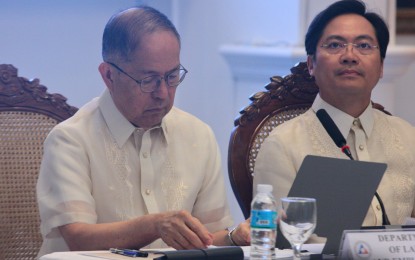
INHERENT RIGHT. Labor Secretary Bienvenido Laguesma (left) and Civil Service Commission Chairperson Karlo Nograles during the launch at the Department of Justice in Manila on Monday (April 29, 2024) of the amended implementing rules and regulations on how government employees may organize. The revised rules seek to continuously improve and safeguard the exercise of the right to self-organization in the public sector. (PNA photo by Benjamin Pulta)
MANILA – The amended implementing rules and regulations (IRR) on how government employees may exercise their rights to organize was launched Monday by the Public Sector Labor-Management Council (PSLMC) at the Department of Justice (DOJ) in Manila.
The PSLMC is an inter-agency body responsible for implementing laws, policies and programs on the right to organize in the public sector.
The 2024 IRR is an integration of promulgated and published policy resolutions approved by the PSLMC over the years, 20 years after the previous amendments.
It includes amendments on conciliation services, effectivity of collective negotiation agreements, and recognition of national employees’ organizations.
The rules also incorporate the latest policies on the functions and administration of a public sector employee organization; establishment of employees’ organization transition group, merger and consolidation; change of name and modes of dissolution of employees’ organizations; determination of the sole and exclusive negotiating agent; and dispute resolution and automatic accreditation of the winner in a certification election.
The revised IRR was signed by PSLMC chair and Civil Service Commission Chairperson Karlo Nagrales, PSLMC vice chairperson and Labor Secretary Bienvenido Laguesma, and representatives of member agencies, namely, the DOJ, Department of Finance and Department of Budget and Management.
“The IRR we sign today is a promise -- a promise to safeguard the rights of those who serve our country, to support their well-being and to support their invaluable contribution to our nation,” Justice Secretary Jesus Crispin Remulla said in his welcome message read by Undersecretary Frederick Vida.
“Government employees are the engine of our bureaucracy, the unseen hands that guide the ship of state. They translate policy into action, rights into realities, and service into progress. Their ability to organize is pivotal to a responsive and resilient government.”
Meanwhile, Nograles emphasized the importance of good employee relations in advancing employee welfare and participatory governance.
“The promulgation of the 2024 Rules is a testament of the Council’s commitment to continuously improve and safeguard the exercise of the right to self-organization in the public sector,” Nograles said in his message.
“We recognize that the new rules and regulations may not be absolutely perfect, considering the dynamic environment that they will operate within. However, this acknowledgment should not deter us from actively engaging in shaping the trajectory of employee relations in the public sector.”
As of December 2023, there are 2,040 registered government employee groups nationwide, 47 percent of which are in local government units.
Of the total, 1,405 are given the privilege of being the sole and exclusive group negotiating with their respective management for terms and conditions of employment not fixed by law.
A total of 845 agencies have registered collective negotiation agreements. (PNA)
